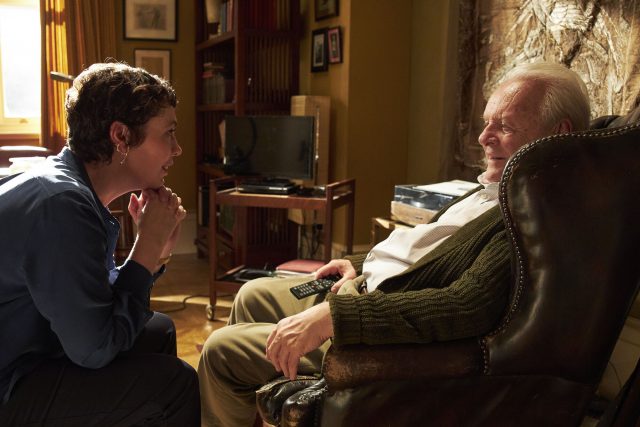The Father: What He Has, by David Bax

Much of the music in Florian Zeller’s The Father is diegetic, or at least partially so, the music on the headphones of Anthony (Anthony Hopkins), the patriarch of the title, expanded to fill the movie. All of it is beautiful, classical and, in an intentional juxtaposition to the structure of the film, it unfolds logically, neatly, one movement following another as intended. Of course, that’s generally how music goes but the reason I say the juxtaposition is intentional is because of the exception that proves the rule. In one scene, the CD to which Anthony is listening starts to skip, the music no longer obeying the temporal laws according to which it was designed. Anthony ejects the disc and gives it a cleaning with a handy microfiber cloth. But that’s not something he can do to his deteriorating mind and memories.
Anthony either lives alone with the occasional visit from his daughter, Anne (Olivia Colman) and her husband, Paul (Rufues Sewell), or he lives in a spare bedroom in their home. We don’t always know which is the case because Anthony doesn’t always know. He does know that he mostly likes the new caregiver, Laura (Imogen Poots), that Anne and Paul have hired, even if he resents the necessity for her. But he doesn’t know the other two people (Olivia Williams and Mark Gatiss) who seem to keep appearing, insisting as fact on things that seem ludicrous and baffling to him.
This family, whoever they are outside of contending with Anthony’s dementia, seem to be of some means. The result for us is that, first, we never see Anne and Paul arguing over money. The decision to hire Laura is not a financial one and, when the subject of nursing homes comes up, the cost is not among the objections to them. This leaves the couple free to argue about other matters. The second thing it means is that everything unfolds against a handsome, well-appointed backdrop of Peter Francis’ production design and Amanda Dazely’s art direction, matched by Ben Smithard’s somber but thoughtful cinematography.
That’s all to our benefit because Zeller peppers The Father with what I’ll call “still life of apartment” shots. Or, really, I should say “still life of flat” because this is London and the word “flat” is spoken roughly 300 times in the movie. It’s important to get to know these locations because Anthony is so preoccupied with his home and surroundings. But these shots are also heartbreaking, showing us Anthony’s space without him in it, which is gradually becoming the case even as his physical form hangs around.
In case it’s unclear, The Father is often an emotionally taxing experience. The sadness of Anthony’s slow mental demise is complicated by the fact that he is quite often a cruel man. Nothing in the movie exists outside of its immediate time and place so Zeller (adapting his own play) deliberately doesn’t let us know if these verbal attacks are brought on by his illness or if they are inherent to the man’s character.
Even by the end, there are no clear answers on any of this. And that is Zeller’s most commendable commitment. There is no scheme here, no key or legend that allows us the comfort of understanding what’s really going on beyond Anthony’s confusion. This man is our point of view character; even the scenes without him in them later prove to be untrustworthy and, perhaps, invented by his discombobulated brain. The Father would make a fitting, if drastically less funny, companion to Elizabeth Chomko’s What They Had, a film about the fallout of Alzheimer’s on the family members of the afflicted. Here, we only get hints of their pain glimpsed through the enveloping fog of Anthony’s.




























Correction: Yorgos Lamprinos was the EDITOR. Peter Francis was the Production Designer
Thanks! Corrected!
– David